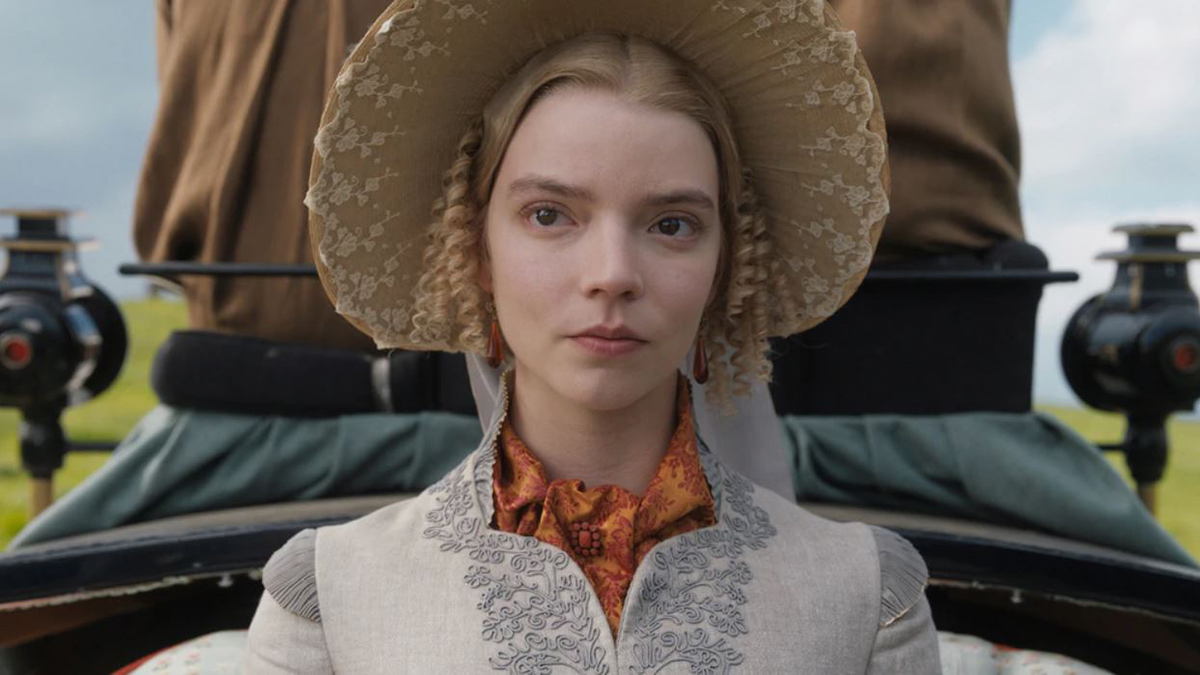“Emma,” the first straightforward film adaptation of Jane Austen’s classic text since Douglas McGrath’s 1995 take, is arduously faithful to the text in all respects but one: The most romantic scene is interrupted by a nosebleed. This is the perfect distillment of Autumn de Wilde’s prim and winking “Emma,” a film as technicolor-lush as Sofia Coppola’s “Marie Antoinette” and as subversively fanatic about its source material as Greta Gerwig’s “Little Women.” With winsome performances, eye-popping art direction, and witty repartee, de Wilde’s adaptation is, like its protagonist, “handsome, clever, and rich.”
Twenty-five years after Gwenyth Paltrow played Emma Woodhouse, Anya Taylor-Joy has taken on the famous meddler’s bonnet. With a cloud of corkscrew curls and closets bursting with pastel petticoats, Emma prances her way through Highbury playing matchmaker. Compelled to stay at home with her marriage-averse father (Bill Nighy), Emma busies herself with the love lives of her friends, pitiable orphan Harriet (Mia Goth), reclusive bachelor Mr. Knightley (Johnny Flynn), minister Mr. Elton (Josh O’Connor), and the mysterious Frank Churchill (Callum Turner). The ensemble is undeniably charming – especially Taylor-Joy, Goth, and Flynn – but Goth and third-act savior Tanya Reynolds are the only two youngsters particularly adept at comedy. (Nighy, in all his bumbling glory, is, of course, right at home here – so long as said home is not too drafty.) Though one of the most talented young actresses working today, Taylor-Joy seems better suited to roles with high stakes.
If “Emma” lacks one thing, it is gravitas. Light as a peacock feather, it can be difficult to get lost in this particular story, no matter how ultimately romantically satisfying, when all of its conflict can be (and is) solved by basic communication. This becomes doubly true should you turn on your conscience at any point while observing Emma’s waitstaff, a small but mighty team of servants who silently endure the most thankless of roles, from lantern-bearer to screen-placer. Though de Wilde frames these tasks wryly enough, it can still be a struggle to sit, in the economically desperate twenty-first century, and pity a woman who has indentured another woman to take her socks off for her.
Nit-picks aside, “Emma” is a strident, florid film that marks triumphant debuts for both de Wilde and screenwriter Eleanor Catton. De Wilde expertly wrangles an all-star creative team, with cinematographer Christopher Blauvelt (“First Cow,” “Mid90s”), costumer Alexandra Byrne (“Mary Queen of Scots,” “Thor”), and production designer Kave Quinn (“Trainspotting”) producing drool-worthy shots that are accessibly frothy rather than self-consciously cool. It is a tonally pitch-perfect film, at once sentimental and rational despite its silliness. Perhaps most pleasurably, its foremost couple is, as in the source material, strikingly egalitarian: a good match financially, intellectually, and romantically.
This is the cinematic equivalent of eating a macaron, a bourgeois treat best enjoyed for its prettiness rather than its substance. But much like a good macaron, a well-done period romance – interesting, well-paced, relatively pro-woman – is a deceptively hard thing to make. This is one exquisite petit four. [B]





